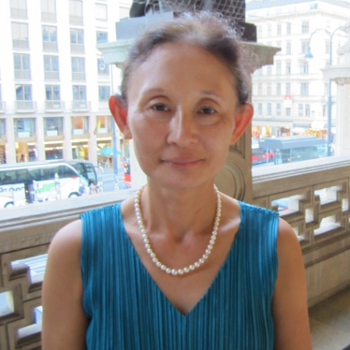Willy Decker’s 2003 production of Götterdämmerung, with his hallmark of minimal and static staging with a large picture frame saved the best until last. Siegfried was just murdered by Hagen in Act 3. As the Funeral March was beginning, the stage was cleared of Hagen and his men, leaving Siegfried in his death struggle. On the darkened platform in the back, a figure clad in black remained alone with his back towards the audience. As he slowly turned around, we recognized the familiar black eye-patch and the broken spear he carried: it was Wotan, back to witness the end of his reign. Wotan motioned towards his dying grandson in a futile attempt to save him. As Siegfried collapsed in death, a black screen came down for the audience to savour the majestic music, the hero’s tragic death made more intimate by Wotan's presence.
Wotan also reappeared in Brünnhilde’s Immolation Scene. As she sang on the black stage platform with Hagen and Gutrune to the side of the foreground, Wotan came to stand behind Brünnhilde to hear her message that she would complete his plan, and that he could now “rest”. With that, Wotan left the stage, leaving Brünnhilde to save the world from the curse of the Ring, returning it to the Rhinemaidens, before joining a group of gods sitting on the theatre chairs in the back. As the music played the Fall of Valhalla, Brünnhilde and the gods disappeared below stage, and Hagen was stabbed to death with his spear by an avenging Gutrune, who then laid down to die. The final image was that of a lone Rhinemaiden with a small white globe, the world restored to its primordial state.
The silence in the theatre after the music slowly became one with darkness was long and emotional, as if the audience were shedding silent tears, stunned by one of the most moving endings of The Ring ever experienced. The ovation that followed was thunderous, with most of the audience standing by the time Christian Thielemann, who demonstrated a breathtaking and tireless reading of Wagner's score, appeared after a stellar cast of singers. It was one of those rare evenings when an excellent musical performance was enhanced by a brilliant coup de théâtre.
Decker’s streamlined staging, with black, grey and white hues, with effective lighting and minimal props other than the ubiquitous chairs carried by the chorus, was a double-edged sword. It helped the audience to concentrate on the music without lots of distracting stage business. Even the hall of the Gibichungs was far from ornate, with two leather chairs and a portable bar. A great deal was required of the singers to inhabit the characters they portray, both in singing and acting. Nina Stemme as a commanding Brunnhilde and Andreas Schager as an exuberant Siegfried both brought vocal power and subtly to their demanding roles. Schager was touching in his recollections in his death scene, and Brünnhilde’s Immolation showcased Stemme’s versatility as she brought a variety of vocal colours to complete the saga.
Falk Struckmann’s Hagen boasted of powerful singing mixed with dark humour. Iain Paterson played Gunther as a spoiled bully, while Gutrune was sung with elegance and lyricism by Edith Haller. Christa Mayer’s Waltraute and Albert Dohmen’s Alberich, fine singers both, suffered from lack of detailed directing and personal charisma as their brief but crucial scenes did not make much impression. The Norns and Rheinmaidens, bald-headed and dressed in unflattering grey, made strong contributions.
The evening, aside from Stemme and Schager, belonged to Thielemann and the Staatskapelle Dresden. Thielemann set a brisk but unhurried tempo, and succeeded in bringing out musical themes and phrases that highlighted the text in a clear and memorable fashion. He succeeded in disentangling the dense orchestration into delightful stacking of strings, woodwind and brass, as each and every instrument came alive under his direction. While there were a few imperfect notes from the horns throughout the evening, they were minor issues in the overall excellence of the musical performance. There was no wasted pause or hesitation; everything flowed in a natural and entrancing inevitability, and the evening was over before we hardly noticed the passage of time. While the orchestra at times threatened to overwhelm the singers, Thielemann waited to unleash the volume and power of the orchestra until he and the musicians were alone with the closed curtain during the musical interludes. The wall of sound, astounding and overwhelming, was what made the evening special, combined with the memory of splendid singing and moving theatre.




